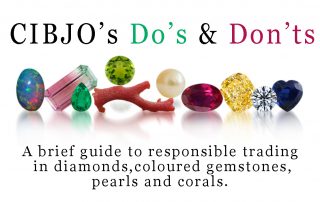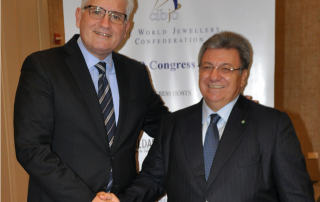About Steven Benson
This author has not yet filled in any details.So far Steven Benson has created 302 blog entries.
CIBJO releases simplified guide to responsible practices in diamond, coloured stones, pearl and coral trades
March 12, 2019
CIBJO, the World Jewellery Confederation, has released a simplified guide to ethical and responsible practices in the handling and trading of diamonds, coloured gemstones, pearls and coral, and has made it available for downloading in PDF format from the CIBJO website, in multiple languages, free of charge.
The 10-page to 13-page document, depending on the language in which it is downloaded, provides easy-to-understand guidelines for industry professionals concerning the disclosure and description of natural and treated gem materials, synthetics and other artificial products, as well as recommendations about information that should be requested from suppliers.
The document is intended to support jewellery business owners and professional staff, but it is not intended to replace CIBJO’s Blue Books, which are comprehensive guides of standards, practices and nomenclature for diamonds, coloured gemstones, pearls, coral, precious metals, gemmological laboratories and responsible sourcing, nor in any way supersede national legislation or regulations, or internationally approved protocols.
“The Do’s & Don’ts Guide is intended to serve as a quick and simple reference for industry professionals, to ensure that responsible practices are being applied,” explained Roland Naftule, President of CIBJO’s Sector A, which covers all gem materials and was responsible, along with the help and support of his vice-presidents, for producing the document. “We encourage all members of the industry to become familiar with the various Blue Books, but we appreciate that on the spur of the moment they can be overwhelming in terms of size and complexity. For that reason we produced this more concise and easily-read guide, with the goal being to promote consumer confidence through ethical trade.”
“Consumer confidence is the bedrock of the jewellery business, and to maintain and enhance this it is critical that responsible practices be applied, by all participants at every stage of the chain of distribution,” said CIBJO President Gaetano Cavalieri. “Our new Do’s & Don’ts Guide is designed to support this objective.”
To download CIBJO’s Do’s & Don’ts Guide from the CIBJO website, PLEASE CLICK HERE.
The guide can currently be downloaded in English, Arabic, Dutch, French, Hebrew, Italian and Portuguese. Additional language versions are currently being prepared and they will be added to the website as soon as they become available.
Harmonisation of standards, terminology and testing methods critical for Chinese trade’s development, CIBJO President tells Hong Kong seminars
ABOVE: CIBJO President Gaetano Cavalieri addressing the international standardisation seminar in Hong Kong on February 28, 2019.
March 5, 2019
Strict adherence to agreed-to grading standards, nomenclature and methods of testing are prerequisites for the development of the gemstone and jewellery industries in China, which are keen to establish a leading position internationally, and in the Asia-Pacific region in particular, CIBJO President Gaetano Cavalieri told audiences in Hong Kong last week. Both events took place during the Hong Kong International Jewellery Show, organized by the Hong Kong Trade Development Council (HKTDC).
The CIBJO President was a keynote speaker at the two seminars. The first, which was held on February 28, looked at prospects for international standardisation, and was organised by the National Gemstone Testing Centre (NGTC) of China, and the second, held on March 2, looked specifically at Fei Cui testing, and was organised by Gemmological Association of Hong Kong (GAHK), together with the Hong Kong Council for Testing and Certification and the NGTC.
Appearing alongside Dr. Yang Lixin, the Director of NGTC’s Standardisation Department, at the international standardisation seminar on February 28, Dr. Cavalieri noted that an historic revision of the standardisation systems is currently underway in China. “The success that China will have in setting standards, and then ensuring that they are applied, or at the very least accepted in other countries, will to a large degree affect the Chinese jewellery industry’s success in Asia and the Pacific basin,” he said. “The question that I am addressing today is how should these standards and nomenclature be developed and applied?”
There is a readiness among the authorities involved in the reform of the standardisation process in China to defer to standards devised by non-governmental standard-setting organisations, such as CIBJO in the jewellery and gemstone sectors, the CIBJO President noted. “I would strongly recommend that Chinese organisations like the National Gemstone Testing Centre not only adopt the ‘association standards’ articulated in CIBJO’s Blue Book system, but also play a greater role in helping formulate the Blue Book standards, so as to ensure that they meet the requirements of your domestic market, and also the markets through the Asia-Pacific area,” he stated.
Dr. Cavalieri proposed that NGTC lobby the Sub-Committee on Standards and Conformance (SCSC) of APEC, the Asia Pacific Economic Cooperation Alliance, to develop common standards and nomenclature, based on the CIBJO Blue Books, in the 21 member countries – not a only for diamonds, but also coloured gemstones, pearls, precious coral and precious metals, and possibly precious materials with which China has a uniquely special relationship, like jade. “CIBJO will be your partner in the venture,” he said.


Dr. Yang Lixin, Director of NGTC’s Standardisation Department, addressing the international standardisation seminar on February 28.


Kent Wong, Managing Director of the Chow Tai Fook jewellery group and Chairman of the Jewellery Advisory Committee of the Hong Kong Trade Development Council, addressing the seminar on the internationalisation of the Fei Cui Standard on March 2.
Jade, jadeite, omphacite and kosmochlor, which in China collectively are referred to as Fei Cui, fell under the spotlight at the seminar on March 2, and in particular upon a testing program developed in Hong Kong, which it is hoped will play a key role in the global popularisation of such jewellery outside of its home market.
“Fei Cui is an excellent example of a product and an industry that has not been transported or translated well outside of its primary market, which of course is China,” Dr. Cavalieri noted, pointing out that, in terms of market value, after diamonds, jade products make up the most valuable gem sector in the worldwide jewellery industry.
“While Western companies managed successfully to bring diamonds to China, the same cannot be said about jade producers and traders bringing their products to the West. Indeed, I think I can comfortably state that the international potential of Fei Cui is nowhere close to being realised,” the CIBJO President stated.


CIBJO President Gaetano Cavalieri (centre) receiving a gift of appreciation from Liang Zhenjie, Deputy Director of NGTC, and Eddie Fan, Chairman of GAHK, during the seminar on the Internationalisation of the Fei Cui Standard on March 2.
To a large degree the popularity that diamonds now enjoy in China can be attributed to the tremendous effort that was employed in creating the infrastructure and partnerships necessary, and also in branding and marketing. But there is another critical element in that success story, Dr. Cavalieri stated. “It was the fact that when it came to describing the diamond, qualifying the criteria by which it is graded, and listing the types of treatments and enhancements that needed to be disclosed, systems had already been developed that ensured that, even though we all may speak in different languages, we can understand each other when it comes to the product. That lies at the heart of CIBJO’s mission, and it is also why the work being done by the Gemmological Association of Hong Kong and others in the formalization of Fei Cui testing is so important.”
“But doing the research is not enough. To properly internationalise the product, it is essential that the testing and grading standards be internationalised as well,” he stated.
To date most gemmologists outside of China and Hong Kong have preferred to identify the materials covered by “Fei Cui” individually, or sometimes in the case of mixtures, by combining the internationally agreed nomenclature – namely jadeite, omphacite and or kosmochlor. This currently is the approach taken in CIBJO Coloured Stone Blue Book. “The Fei Cui testing standards that have been developed are certainly more appropriate for a major market, such as that which exists in China, and the one that could potentially develop elsewhere in other parts of the world,” Dr. Cavalieri said.
“We are open to discussing changes, especially given the growing dominance of the Chinese markets, and the massive popularity of Fei Cui in this region,” he continued. “But clearly we are dependent on your input. It is possible to align the Fei Cui testing standards with the CIBJO Blue Books, but to do that successfully we require the experience, expertise and wealth of knowledge that has been acquired by the Gemmological Association of Hong Kong and others in this area.”
“The success of Fei Cui of repeating its success in China and South East Asia, in other countries as well, will depend in part upon the companies dealing in these materials showing the same skill and commitment as the diamond industry did in China 20 years earlier,” Dr. Cavelieri said in conclusion. “But it will also depend on our collective ability to transform the Fei Cui testing protocols that you have developed into international standards. We invite you to work together with us in assisting Fei Cui achieve its full potential, not only in China and Asia, but across the globe as well.”
Vice President Eli Avidar to leave position at CIBJO, to run for political office in Israeli parliamentary election in April
ABOVE: Outgoing CIBJO Vice President Eli Avidar (left), with CIBJO President Gaetano Cavalieri.
February 7, 2019
Eli Avidar, CIBJO Vice President, has resigned his position at the World Jewellery Confederation, announcing that he plans to run for national political office during the upcoming parliamentary elections for the Israeli Knesset, which will take place on April 9.
“Five years ago I had the honour and the privilege to be invited to join the CIBJO Board of Directors by the President, Dr. Gaetano Cavalieri, and given the opportunity to serve as Vice President. In 2007 I left the Israeli Foreign Ministry, where I had served as a career diplomat, to join the diamond industry. Now 12 years later, I feel compelled to go back and serve my people, as an elected member of the Israeli Knesset.”
“I greatly value my time in the industry, and in particular the period I served as a CIBJO officer,” Mr. Avidar continued. “In particular I feel indebted to Gaetano, who taught me a great deal about the meaning of leadership. I am privileged consider him a dear friend.”
“It is with regret that we we accept Eli’s resignation, but we applaud his reasons for doing so,” said Dr. Cavalieri. “There is no higher calling than public office, and from our experience Eli has the commitment, knowledge, skills, talent and motivation to be a tremendous parliamentarian. Our loss will be his country’s gain. We wish him the very best of luck.”
In addition to his position at CIBJO, until 2018 Mr. Avidar and served as Executive Director of the Israel Diamond Exchange and Managing Director of the Israel Diamond Institute.




